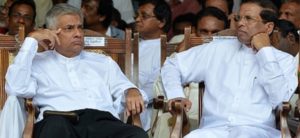
June 2, 2018
By Asanga Abeyagoonasekera
There is piercing hopelessness for the future when listening to certain political rhetoric in Sri Lanka. The International Workers Day, a day to remember workers’ rights, was initiated from the 1886 Haymarket affair in Chicago. It grew from a general strike for the eight-hour workday and has over time developed into a showcase of political muscle at the May Day rally. The competition among the political parties is to generate the most amount of crowd moving out of the initial idea.
The line that divides the opposition and government in Sri Lankan politics has been blurred by a bipartisan mechanism introduced by the incumbent government. It is further blurred with 16 Sri Lanka Freedom Party ministers having become part of the joint opposition or ambiguous in their political affiliation. Political party loyalty and discipline has reached the lowest ebb in Sri Lankan politics.
The appointment of cabinet ministers at the beginning of this month to what the largest cabinet in the world is perhaps has been questioned by former members of the former government who claim there is no scientific basis to the allocation of ministries to particular individuals. Such an accusation leaves the general public to wonder if the previous government itself had a mechanism to select its cabinet ministers. Although there was a message to the public from certain politicians including a senior cabinet Minister who said: “Cabinet reshuffle will take place in a scientific manner” and that a “scientific formula” was introduced to allocate ministers, the substance of the formula was not revealed to the public. A government should allocate its cabinet ministers based on merit and achievements in their area/s of expertise even though party leaders will be limited to selecting only 25 out of 225 members. Whatever the “scientific formula” used was, it will not give results because most members of parliament were elected from a grave miscalculation, and not based on merit.
Sri Lankan political scientist Dr. Jayadeva Uyangoda rightly calls for academic scrutiny of this changing behavior of political party members towards their leadership, especially on the question of party discipline/indiscipline changing the dynamics of Sri Lanka’s political party system. According to Dr. Uyangoda, “Sri Lanka’s political parties have become new creatures with some unusually new characteristics. Monitoring these new changes requires not only scholarly vigilance but also detachment from our old images of what democratic political institutions are.” The new creature created by the system sows confusion for political society.
Moving from domestic political society to the international, China’s President Xi Jinping recently spoke of Karl Marx’s idea of the struggle of the proletariat, the ideal that underpins some international workers’ movements. Xi said, “Writing Marxism onto the flag of the Chinese Communist party was correct.” Two centuries since Marx’s death, while advancing a much more open economic system, the leader of the second largest economy of the world said Marx is “the greatest thinker of modern times.” As a rising power, China liberalized its economy and ushered in globalization to move millions out of poverty.
Closer home in South Asia, India took up a somewhat similar formula. As China and India underwent these changes, their respective foreign policies were impacted. After 1990, with the end of the Cold War era, India underwent two important adjustments to its foreign policy: first was economic liberalization and deregulation; and the second was India’s changing relationship with the US. In their book, India at the Global High Table: The Quest for Regional Primacy and Strategic Autonomy, ambassadors Teresita and Howard Schaffer correctly identify this phenomenon. Over 50 years ago, the classical realist international relations theorist Hans Morgenthau had explained that “The character of foreign policy can be ascertained only through the examination of the political acts performed and of the foreseeable consequences of these acts.” By assessing given actions, one could evaluate what statesmen have done for the foreign policies of their countries and the profound impact on the outlook towards the world outside. Sri Lanka, with its middle path idealistic foreign policy, is stuck somewhat in the non-aligned past, which needs re-calibration towards a more realistic approach in this century. The idealistic view adopted in the past could be due to the influence of Buddhist values towards our leaders.
Today, China has expanded its trade with the US. Nonetheless, in the past few weeks, Beijing has faced a serious trade war with Washington due to the US Department of Commerce ban on ZTE, one of the largest Chinese telecommunications companies in the US. In February 2018, US intelligence agencies warned Americans against buying products from ZTE and Huawei, another Chinese telecom company, claiming that the companies posed a security threat to American customers. The chairman of ZTE called this “unfair and unacceptable,” decrying the US export ban as a massive disruption to its business since the company relies on US firms for key smartphone components.
This incident is a clear indication of how national security plays out in the present context despite an open trade policy. Meanwhile, Sri Lanka has opened its gates for the lowest price with a high percentage of telecommunication infrastructure based on ZTE and Huawei products. Such a predicament was anticipated and highlighted during a discussion of experts from national security think tanks in Sri Lanka a year ago. Its outcome was circulated among the highest policymakers.
Should such warnings from experts go unheeded?
